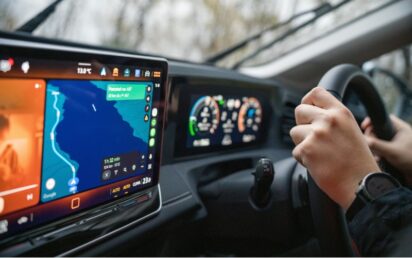The used car market has, for a long time, been somewhat of a lottery, often requiring extensive knowledge to ensure a good deal. However, thanks to several technological innovations in recent years, buying used cars online is now easier, more transparent, and more secure than ever before.
Previously, buying a used car often meant visiting multiple forecourts or trudging through dealerships, haggling over prices, and facing general uncertainty regarding the car’s history and performance. These days, roughly 86% of car shoppers conduct online research before visiting a dealer or private seller, making more informed decisions and securing the best possible deal.
In this article, we’ll explore how technology helps you make smarter, safer used car purchases in the UK – from AI pricing and virtual tours to online financing and transparent vehicle history tools.
The Digital Revolution in Used Car Shopping
Traditionally, many UK buyers would flip through weekly printed catalogues with listings in their local area, or visit local dealerships to browse the available selection of used cars in their vicinity. Often, this left buyers feeling quite limited in terms of options and uncertain about reliability and trust. However, with the rise of online platforms and marketplaces, people now have access to a broader, more open, and transparent market.
Online Marketplaces help Consumers Buy Used Cars Online
With just a few clicks, potential buyers can now browse a wide range of car makes and models, narrowing down their search through extensive filters, directly from their smartphone, wherever they are located. Marketplaces such as AutoTrader, Cazoo, Cinch, and even Facebook Marketplace offer great flexibility and accessibility when searching within specific price ranges, zip codes, or for particular models or variants. Many buyers actually save costs compared to buying from dealerships.
Compared to the ads and magazines of the past, these online platforms tend to provide prospective buyers with a significant upgrade in terms of immediate information. For one, listings now often feature 10 or more images from different angles. Furthermore, innovations like virtual 360° views make it even easier to buy a used car online. With the rise of services like Carvana/Vroom, we are now seeing that people buy cars they haven’t even seen in person, as long as the process is trustworthy.
The reason for this shift is apparent, as it provides a significant upgrade in terms of convenience. Previously, buyers could easily spend 10 or more hours over multiple weeks searching for their next car, but now much of the car search can be done online, often in a single evening. This trend fits perfectly with the modern, busy lifestyles, while also saving on transportation costs.
Blending Online and Offline (Omnichannel Experience)
The benefits are not only applicable to private sales but also extend to commercial car dealers, as they are fighting for attention online as well. Generally speaking, some of the best experiences often combine digital convenience with a bit of the traditional process when needed. For example, buyers can do initial shopping online and then schedule an on-site test drive or pickup.
Many dealerships now have their own digital storefronts for showcasing their cars, where they often go above and beyond in terms of presentation. In the UK, many professional car salesmen produce high-quality videos for each car. These videos typically provide a brief explanation to help attract buyers and inform them of the vehicle’s specifications. They are also increasingly offering click-and-collect services, fully eliminating the need for travel, making it possible to buy cars online from anywhere in the country with ease.
Virtual Showrooms and Immersive Car Tours

While simple video walkthroughs have been a common practice for several years, many dealerships and private sellers have taken this to the next level by offering high-tech remote viewings of cars through virtual car tours. These videos often incorporate VR and AR elements thanks to new and accessible apps, providing even greater detail and confidence when buying online.
360° Views and VR Test Drives
Modern used-car sites often offer 360-degree panoramic tours of the vehicle’s interior and exterior. Users can rotate the view, zoom in on details, such as the tread of a tyre or the dashboard condition, giving a sense of inspecting the car remotely. Some platforms or dealer websites even support VR headsets for a virtual showroom experience, or video calls where a salesperson walks around the car.
This technology allows buyers to experience a car virtually before deciding to see it in person, which is crucial for those buying from sellers far away. It builds confidence and makes online purchases more likely, as buyers can trust they’ll actually get the advertised car in question, without hidden damage or missing features.
AR takes this a step further by overlaying digital information directly onto a live video feed. Buyers can simply point their phone at a car and see key specifications, such as horsepower, torque, and fuel efficiency, and hover over the vehicle itself. This is becoming increasingly common and greatly enriches the overall experience, as it provides a deeper understanding of the car’s capabilities without requiring the need to search through brochures or websites.
Remote Inspections with AI
One of the main reasons why checking out a used car in person before a sale is important is the opportunity for manual inspections. The advice has always been to bring a knowledgeable car person with you when looking at a used car. They can spot most signs of future trouble, whether from mechanical wear, hidden accident damage, corrosion, or neglected maintenance.
Artificial Intelligence has now made remote inspections a possible alternative in many cases. Some platforms and marketplaces offer computer vision to automatically detect scratches or dents from photos. There are also apps where buyers or sellers can scan the car using their smartphone’s video, and then an AI will flag any issues or rate the car’s condition.
Other useful technology includes the now very affordable OBD-II scanner apps and remote diagnostics tools. Buyers or sellers can plug a device into the car and share live health data of the vehicle’s engine and systems directly through an app. These free apps help buyers obtain “official” technical assurance on the car’s condition beyond its appearance. Any major issues will be flagged by the car’s internal systems and thus appear on the scanner.
These virtual and AI-assisted tools almost make it feel like having a mechanic with you when shopping remotely, greatly reducing the risk of surprises. The tools also help increase transparency about the condition of any used car, even if you haven’t physically inspected it yet. Now that we’ve covered how one can see and inspect cars using tech, next we’ll cover how technology helps match the right cars to the right buyers and ensures fair pricing.
Smart Algorithms and AI Car Pricing Powering Used Car Deals

It is also possible to utilise the technology for purposes beyond inspections and walkthroughs. AI in car buying has also opened up the door to car recommendations and even the automatic pricing of used cars, removing much of the guesswork and uncertainty that characterised the past.
Personalised Car Recommendations (AI Matchmaking)
Just as streaming services suggest movies, AI now helps suggest cars. Many platforms have begun tracking user preferences (with consent), allowing them to build a small set of details about your preferences and needs. Their systems quickly learn what types of cars you are looking for, your budget, and maybe even your preferred colours. This allows marketplaces to show you more relevant cars, saving you time in the process.
This trend has made searching for used cars online even easier, while also removing many of the uninteresting car listings that are either out of your price range or simply poor matches for your specific needs. We are also seeing advances on dealer websites, where AI chatbots can answer your questions 24/7, helping you browse inventory and even answering financing questions instantly, resulting in an interactive shopping experience.
How AI Is Powering Used Car Deals
Once you have found an interesting car, how do you then gauge whether the listed price is fair and in accordance with the overall market value? Technology also offers a solution in this case, as AI has been used to great success in analysing current market data, taking supply and demand, as well as historical sales, into account to provide accurate price ranges.
Buyers can now instantly determine whether a specific car is a great value or possibly considered overpriced with a level of certainty and confidence that was not previously possible. No longer do buyers need to rely on outdated indexes that often lag behind actual market data, or even worse, rely on a salesman’s word. AI provides a data-driven answer based on the entire market.
Sellers also have an easier time, as it helps them price cars competitively to strike the best balance between how long a car sits in their inventory and the profit they stand to make. They often have dynamic pricing adjustments as well. This makes buying a used car or trading in your old car through a dealership in the UK even more responsive to market movements, making it a viable option in many cases.
Financing and Fintech Innovations
Another major trend in the used car market revolves around the financing aspect, as AI and smart tools also provide some interesting options for both sellers and buyers in this case. In general, buying a used car has become much smoother with the help of technology. Online financing applications can now give near-instant loan pre-approvals. Many platforms enable buyers to receive loan offers within minutes by conducting a soft credit check, without affecting their credit score.
When it comes to registration and documentation, online tools that facilitate digital paperwork also make life easier. Here, e-signatures for contracts, online document uploads, and even online ID verification make it possible to complete the purchase without a mountain of physical paperwork.
For buyers, this means they can now easily compare financing rates from multiple lenders online. Such a transparent approach empowers consumers and shifts the dynamic of the buyer-dealer relationship in general. All of this adds up to a faster, more convenient transaction, where buyers can handle financing from their own home, often getting a better deal by comparing options.
Many of these innovations build trust. Next, we’ll discuss how technology enhances transparency and confidence for used car buyers, a critical aspect of used car sales.
Data Transparency, Trust, and Vehicle History at Your Fingertips

While video reviews, augmented reality walkthroughs, and online marketplace pricing systems help provide a significantly higher level of confidence in the used car buying process, some potential buyers may still be undecided. After all, how do you truly know about the car’s past?
Vehicle History Reports & VIN Decoders
One of the most effective and efficient ways to quickly learn the history of any given car in the UK is to use a vehicle history check. By inputting the car’s unique VIN number into an online tool, you can instantly pull up its background, complete with information about accidents, mileage rollbacks, number of previous owners, outstanding finance and more.
Modern VIN decoder tools, such as carVertical’s VIN checker UK, aggregate data from national and international databases. The service provides buyers with a comprehensive vehicle history in seconds. This use of big data enables you to uncover hidden issues and previous accidents, or even determine if the car was imported from abroad. All before you consider visiting the car in person or buying it online directly.
These options make it easy for buyers to perform a history check themselves, only requiring the unique VIN of the given car. Previously, this would have required an expensive professional inspection; however, now buyers can obtain this information with just a few clicks online, significantly reducing the risk and providing a more transparent buying experience.
Blockchain for Secure Transactions
When it comes to the payment itself, some forward-thinking dealerships and platforms are exploring blockchain technology to further increase trust. Handing over a significant amount of money to a private seller can often feel a bit unsafe. Still, the Blockchain can be used as a tamper-proof escrow system that creates secure digital records of a car’s history and even the sale transaction itself.
While this technology is still considered to be emerging, it is already being used to help prevent used car fraud. Consumers can verify whether cars have fake service records or title fraud by examining their immutable history. Looking ahead, it is also possible that it can streamline ownership transfers by automatically transferring the title when conditions are met.
Online Reviews and Ratings
One of the major benefits of buying anything online, whether a car or a pair of shoes, is the amount of online reviews and ratings you can find. The internet has made dealer and seller reputations visible and easily accessible. Most UK buyers check reviews of dealerships or even individual sellers before making a decision. And many online marketplaces have specific rating systems for sellers. This encourages sellers to be honest and provide good service, as consumers can quickly spot if a dealer has a pattern of complaints.
Enhancing the Experience for Buyers and Sellers

The majority of the technological advances covered in this article have directly benefited buyers. However, these innovations also indirectly benefit sellers, as confident and well-informed buyers are quicker to make a decision and more likely to spend their hard-earned money on a used car once they know it is in good condition and has a good vehicle history.
For Buyers – Convenience and Confidence
- Time-saving:
- No need to spend weekends visiting multiple dealerships or private sellers.
- Entire research, comparison, and even negotiations can now be done online in a single evening.
- No need to spend weekends visiting multiple dealerships or private sellers.
- Wider choice:
- Online marketplaces provide access to nationwide listings and sellers.
- Buyers can set precise search filters for price, mileage, model, and more.
- No pressure from salespeople, allowing for calmer, better-informed decisions.
- Online marketplaces provide access to nationwide listings and sellers.
- Fairer pricing:
- AI-driven pricing tools increase market transparency.
- Easier comparison across listings helps ensure buyers don’t overpay.
- Lower dealer overheads in online sales often translate into cheaper prices.
- AI-driven pricing tools increase market transparency.
- More confidence and trust:
- Access to vehicle history reports, digital inspections, and online reviews reduces uncertainty.
- Fewer hidden problems, thanks to transparent data on mileage, accidents, and ownership history.
- Buyer protections like return policies, online warranties, and verified listings make purchases safer.
- Access to vehicle history reports, digital inspections, and online reviews reduces uncertainty.
For Sellers and Dealerships – Efficiency and Reach
- Expanded market reach:
- Local dealerships can now list their entire stock nationwide.
- A wider customer base increases chances of finding the right buyer and achieving a better sale price.
- Example: a buyer in London can easily purchase a car from Manchester and have it delivered.
- Local dealerships can now list their entire stock nationwide.
- Operational efficiency:
- Digital tools such as online scheduling, inventory automation, and CRM systems streamline operations.
- These reduce administrative costs and time spent per sale, improving overall profit margins.
- Digital tools such as online scheduling, inventory automation, and CRM systems streamline operations.
- Faster sales cycles:
- AI-driven pricing and online marketing tools generate more leads.
- Cars spend less time on the lot as prices can be dynamically adjusted to match market demand.
- Virtual tours, chatbots, and online financing enhance customer satisfaction and reviews – boosting reputation and repeat business.
- AI-driven pricing and online marketing tools generate more leads.
And finally, with AI optimising pricing and online marketing generating more leads, used cars often spend less time on the lot. Dealers can confidently adjust prices to reflect current market values or deliberately lower or raise prices, depending on their strategy at any given time, thereby improving their profitability and competitiveness. By offering virtual tours, AI chatbots, or online finance, dealerships earn happier customers and positive reviews, which further boost their business.
Future Trends and What’s Next
The used car market’s future looks bright, as we are seeing advances that help both consumers and sellers act with greater transparency, a deeper technical understanding, and increased confidence when it comes to pricing.
Electric Vehicles and New Tech in Used Cars
Another interesting avenue is the rise of electric vehicles and high-tech features. As they become more common in newer cars, they will eventually become part of the used car market, as we are slowly beginning to see. Online platforms are already adapting to include new data entries for battery health reports or charge times, which are listed among their filters, allowing buyers to easily find the best vehicle for their needs.
We expect to see even more advances that help buyers make informed decisions when it comes to buying used EVs, where history checks and diagnostics are crucial to determine which car is the better option.
Autonomous Cars and New Mobility Models
Looking further ahead, mention the possibilities of autonomous vehicles in the used market. Self-driving technology isn’t yet mainstream in used cars, but it could be in the near future. Buyers in a decade might be shopping for used cars that drive themselves, which will raise new considerations, perhaps new kinds of inspections or certifications.
Car-sharing and car subscription services are also part of the evolving landscape, providing an alternative to traditional car ownership, which many UK individuals currently prefer. And even just by existing, these services affect the used car market by providing alternatives to ownership and moving the overall market prices.
Ongoing Digital Innovation
So far, the focus has been on making the process more convenient, transparent, and secure for both sellers and buyers, and we expect this to continue to be the case going forward. We also expect even more integration of technologies, where AI and AR/VR could have even bigger roles in the used car market, further streamlining the online purchase process.
And with every innovation, customer expectations continue to rise, as consumers expect better services, lower prices, and overall improved access to the market. In the years to come, buying a car may become as easy as buying a phone online, where the pressure is shifted further away from the buyer and instead carried by technological advances.
Final Thoughts
Technology has significantly transformed the used car market for the better by making the buying of used cars online easier, safer, and more efficient than ever before. Whether you’re browsing online listings, taking a virtual test drive, or checking a car’s history with a click, you’re experiencing a new era of car buying.


